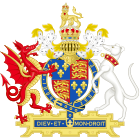| This article includes a list of general references, but it lacks sufficient corresponding inline citations. Please help to improve this article by introducing more precise citations. (February 2018) (Learn how and when to remove this message) |
| Act of Parliament | |
 Parliament of England Parliament of England | |
| Long title | An Act for the Advancement of true Religion, and for the Abolishment of the contrary. |
|---|---|
| Citation | 34 & 35 Hen. 8. c. 1 |
| Dates | |
| Royal assent | 12 May 1543 |
| Other legislation | |
| Repealed by | Treason Act 1547 |
| Status: Repealed | |
The Act for the Advancement of True Religion (34 & 35 Hen. 8. c. 1) was an Act passed by the Parliament of England on 12 May 1543. Its intent was to quash the possession and reading of Tyndale's translations of scripture by "the lower sortes", and any commentary that spread doctrines contrary to Henry's theology, particularly relating to the eucharist and baptism.
It restricted the reading of the English Bible to clerics, noblemen, the gentry and richer merchants, and foreshadowed the promulgation of future authorized versions. Women below gentry rank, servants, apprentices and generally poor people were forbidden to read it, and certainly not to others. Women of the gentry and the nobility were only allowed to read it in private.
The Act allowed moral plays to be performed if they promoted virtue and condemned vice but such plays were forbidden to contradict the interpretation of Scripture as set forth by the King.
The Act claims that "malicious minds have, intending to subvert the true exposition of Scripture, have taken upon them, by printed ballads, rhymes, etc., subtilly and craftily to instruct His Highness' people, and specially the youth of this his realm, untruly. For reformation whereof, His Majesty considereth it most requisite to purge his realm of all such books, ballads, rhymes, and songs, as be pestiferous and noisome". However, the Act also commanded that "all books printed before the year 1540, entituled Statutes, Chronicles, Canterbury Tales, Chaucer's books, Gower's books, and stories of men's lives, shall not be comprehended in the prohibition of this Act".
The Act was repealed under Henry's son, Edward VI (section 2 of the Treason Act 1547).
References
- Great Britain; Luders, A.; Record Commission (1810). The statutes of the realm [1101-1713] : printed by command of his majesty King George the Third; in pursuance of an address of the House of Commons of Great Britain; from original records and authentic manuscripts. University of Southampton. . p. 107.
- "The statutes of the realm : Printed by command of his majesty King George the Third, in pursuance of an address of the House of Commons of Great Britain. From ... v.3". HathiTrust. Retrieved 20 May 2024.
- William Chappell, Popular Music of the Olden Time a Collection of Ancient Songs, Ballads and Dance Tunes Illustrative of the National Music of England: Part One (Kessinger, 2004).
- Janette Dillon, The Cambridge Introduction to Early English Theatre (Cambridge University Press, 2006).